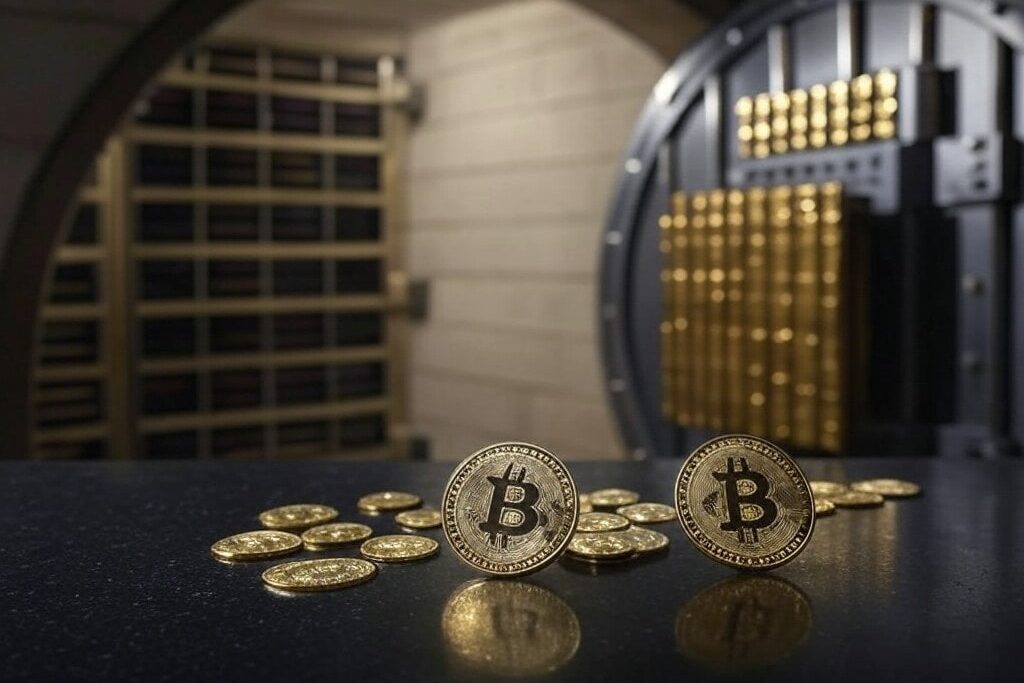
From a strategic and game-theoretic perspective, incorporating Bitcoin into the United States’ reserve assets would be a forward-looking move that positions the nation at the forefront of a rapidly evolving global financial landscape. In an era where economic influence increasingly hinges on digital technology, adopting Bitcoin reserves alongside traditional gold holdings can bolster U.S. monetary sovereignty, enhance strategic leverage, and preserve America’s role as the principal architect of international financial order.
1. Strengthening Financial Sovereignty Through Diversification
Gold reserves have long underpinned confidence in national solvency and economic discipline, but today’s environment of digital innovation and shifting global power dynamics calls for a more adaptive approach. By allocating a portion of its reserves to Bitcoin—a decentralized, universally accessible, and inherently scarce digital asset—the U.S. gains a hedge against both inflationary pressures and overreliance on foreign financial policies. This diversification ensures the U.S. will not be caught flat-footed if global faith in fiat currencies erodes or if adversaries seek to circumvent American influence through alternative monetary arrangements.
2. Gaining a Strategic Edge in the Digital Currency Race
As rival nations experiment with central bank digital currencies (CBDCs) and explore avenues to reduce reliance on the U.S. dollar, America must not stand idle. Embracing Bitcoin secures a critical foothold in a domain where technological prowess and early adoption can confer lasting competitive advantages. Should Bitcoin evolve into a widely recognized reserve asset, the United States would be positioned as a key stakeholder—not a latecomer forced to react to the strategic moves of others. By establishing credible involvement now, the U.S. can guide global standards, influence regulatory frameworks, and ensure that American values, institutions, and priorities shape the rules of digital finance.
3. Mitigating Vulnerability to Adversarial Maneuvers
A purely gold- and dollar-based reserve system, while time-tested, leaves the U.S. open to strategic surprises if competitors adopt innovative forms of digital wealth. Bitcoin’s decentralized nature means it cannot be easily controlled, sanctioned, or manipulated by any single foreign state. By holding Bitcoin, the U.S. deters scenarios in which rivals could exploit its absence from the digital asset sphere. Just as nuclear deterrence prevented hostile powers from claiming dominant positions in past eras, holding Bitcoin discourages adversarial states from gaining asymmetrical advantage in the emerging financial order. In game-theoretic terms, it is a preemptive strategy: claiming the high ground before anyone else can.
4. Preserving the Dollar’s International Prestige
Far from undermining the dollar’s status, a Bitcoin reserve can reinforce U.S. monetary leadership. Rather than resisting Bitcoin’s rise, the U.S. can harness it to support dollar liquidity, market stability, and global financial connectivity. Should Bitcoin become a complementary global asset—akin to a digital gold—the U.S. would be the primary influencer of its narrative and use cases. This influence would maintain the centrality of American institutions in global finance and ensure that the world’s transition to digital money unfolds on terms consistent with U.S. strategic interests, democratic values, and the rule of law.
5. Ensuring Strategic Optionality and Future-Readiness
Reserves are not merely symbolic; they are tools that grant a state the flexibility to respond swiftly to unpredictable economic shifts. Bitcoin’s programmability, portability, and liquidity offer new channels of maneuver. In a crisis scenario, the U.S. could leverage its Bitcoin holdings to stabilize markets, assist allies, or discourage adversarial financial behavior. In more ordinary times, strategic Bitcoin reserves would send a powerful signal to investors, innovators, and entrepreneurs that the U.S. welcomes financial technology, encouraging robust private-sector growth in the digital economy. Such forward-leaning policies foster a climate of leadership rather than reactive adaptation.
The Final Word
Adopting Bitcoin as part of U.S. reserve assets is a strategic investment in the nation’s economic future. It balances traditional gold holdings with an innovative, digital alternative that aligns with the trajectory of global finance. Rather than ceding ground to rivals or clinging to outdated conventions, the U.S. can consolidate its position as the preeminent force shaping the next generation of monetary policy and technology. In doing so, America not only hedges against emerging risks but also ensures that its values, influence, and interests remain preeminent in an increasingly digital world.
